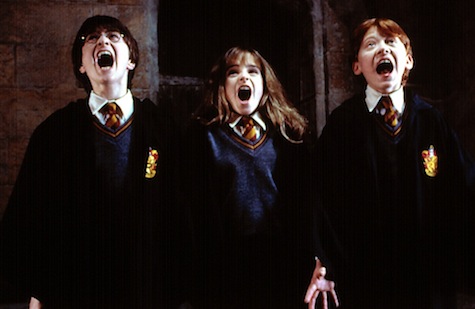The Harry Potter Reread has morphed into a rewatch briefly, which means that it probably sprouted some feathers and gained surround sound hearing, and is fuchsia rather than it’s usual cheery cherry color. (I don’t know, rereads are probably colorful. At least, they are in my head.)
So… what is there to say about Chris Columbus’ first outing into the Potterverse? While it took decades for Lord of the Rings to become a live action trilogy, they were banking on Potter when we were barely halfway through the series. And it was strange. Sort of like this first film.
I was well into Potter Fever when they started on the films, and at the correct age to be stupid excited about them. Which means that far too many times I watched the trailer on repeat before going to school, back when the trailers streamed via Quicktime and other odd options. Really, they had my vote from the John Williams soundtrack on. With the number of iconic themes that man has constructed, you’d think he might have missed a step, but no—the Potter soundtracks he penned were excellent. Just. Just listen for a bit:
Okay, now I can actually refocus on the film. Casting was, of course, the biggest deal for this one and fans were desperate for news of each character. Daniel Radcliffe, Emma Watson, and Rupert Grint were instantly household names, and the world pitied these poor kids from the start; growing up in that kind of spotlight was never going to be a simple task. They were so young, and it shows in this film—there are very few child actors under the age of fifteen or so who don’t appear to be “acting” no matter how good they are at facial expressions and vocal inflection. The trio still pull off some wonderfully real moments for all that, and you can see where each of them will grow into their parts.
I feel terrible saying this, but it seems like the most appropriate point to mention it—I don’t really think Alan Rickman was right for Snape. He’s still excellent in the part because he’s excellent at everything he does, but that doesn’t fix a few very niggling problems for me. For starters, he doesn’t actually play Snape much like Snape. Where the character is meant to be shrill and bellowing, Rickman is sonorous and drawling. Where Severus is meant to be greasy and overstated, Rickman is stately and subdued. Rumor has it that they considered Tim Roth for the part, who I imagine might have played him a bit truer to form. Rickman’s love of the character is certainly commendable, I just wonder how the part would have come off without his literally perfect cadence backing it up.
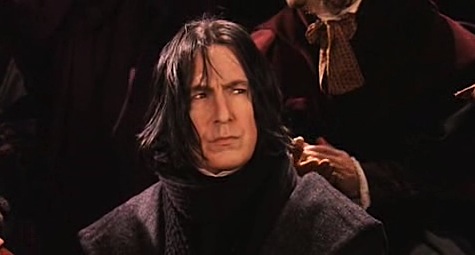
And there’s another problem. Thing is, during this first outing, Severus Snape cannot possibly be older than 31 years old according to canon. Which is not to say that they should have limited the pool of actors based on age, but it did result in the previous generation all being about two decades older than they were supposed to be in the films. Even Harry’s (dead) parents are too old in the Mirror of Erised, and again when their ghosts show up. We can argue that audiences might have been confused to see an eleven-year-old bracketed by two twenty-year-olds, but it really does remove a layer of tragedy from the death of Lily and James Potter. It’s relevant that the first war against Voldemort was only eleven years ago, that the people who stood up to him first were still children themselves. The excuse that moviegoers don’t think that deeply doesn’t really do it for me—I wanted it clear that these people were too young to have seen so much.
Christopher Columbus was chosen as director for the first two movies, though he was not the first pick. That, unsurprisingly, was Steven Spielberg, who opted out of the project because he had several more coming down the pipeline (A.I., Minority Report, and Memoirs of A Geisha were all on the list). Rumor has it that he originally wanted to make the film animated. It was eventually narrowed down to four options, one being Terry Gilliam, who Rowling was keen on. (Can you imagine how that would have worked out?) Warner Brothers went with Columbus, seeing as he had a family-friendly hit record between Mrs. Doubtfire and Home Alone. Rowling had quite a bit of creative control, but it seems to have caused no tension. This film was an affable project, and no one really had a bad word to say about the process once it was over with.
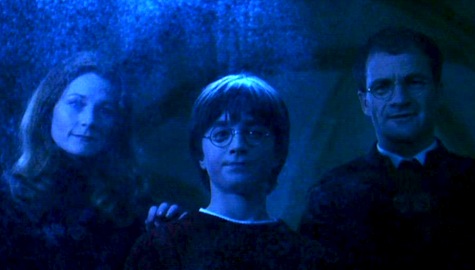
But what about the content of the movie itself? Well, that’s sort of hard to talk about, honestly. Because minus a few word changes here, some interactions cut down there, and a character swap in the detention scene, this film is pretty much the book on screen. It was super fun when it came out, sure, but not that interesting on rewatch because we all know what happens. What really made it a ride was getting to see Hogwarts properly, to watch owls swoop in with letters, to follow Harry and Hagrid through a fully realized Diagon Alley. One of the things that surprised me most about this film was how much the locales looked the way I expected them to, as though they were pulled out of my brain. Rowling herself said that the crew gave her some time alone in Diagon Alley once it was built, and that she just stood there drinking it in.
This is ignoring that the actual setup of Hogwarts in the first film is oddly claustrophobic, with everything laid out relatively close together. All that would be rectified starting with The Prisoner of Azkaban, when they spread out the grounds more and started showing different wings of the castle. It seems fair to cut them creative team some slack, since they were creating an entire world from scratch. I did find the wizarding school caps amusing. (The films, like the books themselves, never come back to those goofy things after the first round.) The choice to confine filming to the U.K. was undoubtedly the best they could have made, and the actual Hogwarts sets at Alnwick Castle and Gloucester Cathedral look spectacular.
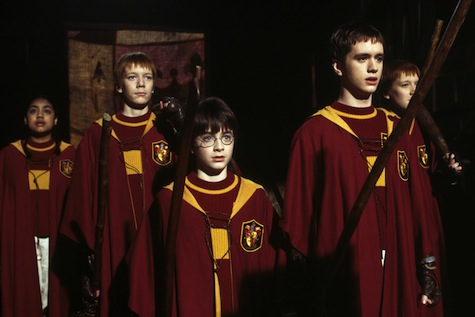
There are a few marked changes that can grate upon repeat viewings. It’s unfortunate that Neville was left out of the detention sojourn and that we saw far less of the centaurs. Snape’s logic puzzle is completely removed from the series of tests between the kids and the Stone. That choice was an obvious one in filmmaking terms—watching something is completely different from reading it. You have different senses engaged and no narration to inform your emotions. In terms of stakes and thrills, nothing was going to top that chess match visually, it had to be last before the final battle. It’s just too bad that they couldn’t have pushed the logic puzzle to earlier.
I can’t help but be bemused by the fact that we get such a different version of Voldemort for this film because he hadn’t been properly cast yet. It’s sort of like the original version of The Empire Strikes Back where Ian McDiarmid hadn’t been cast as the Emperor, and we have that weird holographic meet and greet with him and Vader. When you finally get up close to the Emperor in Return of the Jedi, it’s so clearly a new actor and new makeup, a horse of a different color. Voldemort is exactly the same here, and knowing the real creeping menace that Ralph Fiennes eventually brings to the character makes this version seem so silly. He just sort of hisses? Maybe it’s because he has no vocal cords? Even young Tom Riddle in the next film is more frightening.
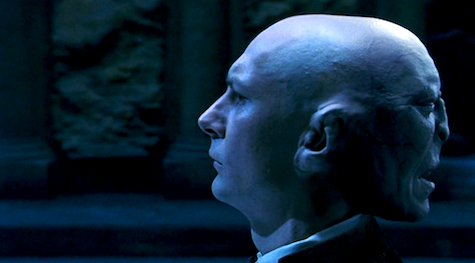
When all is said and done, you have a sweet and passable version of the first book. Nothing jarring, but nothing particularly distressing either.
Here’s an extra layer of weirdness for my part—one of my biggest issues as a reader is lack of sound. I’m an auditory person overall, and often read books aloud when I really want to absorb them. But it also means that sound gets stuck in my head in a way that images don’t. As a result, one major problem I have with this movie is that the line readings are burned into my brain. Which was incredibly annoying while I was rereading the book. I’m actually really excited to get to the other films where the script wasn’t taken verbatim, so I don’t have the actors takes stuck in my head. It’s odd but true.
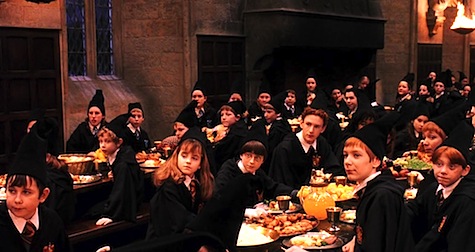
One movie down and seven to go! Though it’ll be a while before we get to them. Considering the fact that I typically never had the books fresh in my head when I went to see the films, this is bound to be a different experience altogether….
(By the way, if you’ve never listened to “Wizard People, Dear Reader” today is just the right sort of day to discover something truly magical. If only to see Harry kill his dracula dad.)
Emmet Asher-Perrin actually might remember the trailer for this movie just as well as she remembers the movie. You can bug her on Twitter and read more of her work here and elsewhere.










